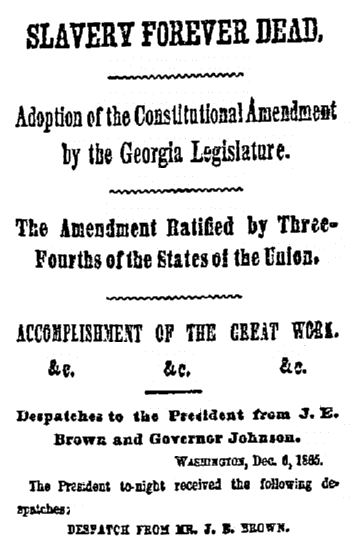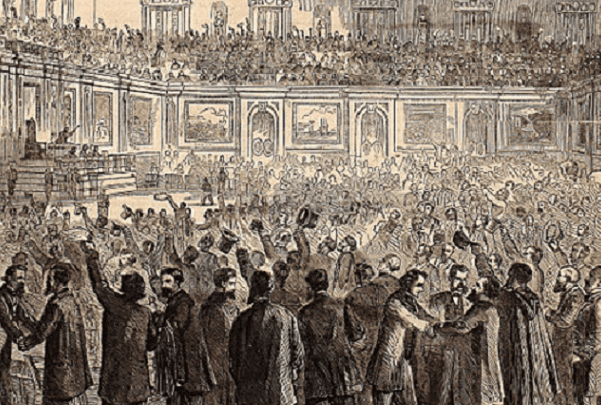To ensure that the Emancipation Proclamation was not a temporary wartime measure and to expand its scope, President Abraham Lincoln urged Congress to propose an amendment to the Constitution permanently banning slavery everywhere in the United States. It had been 61 years since the last constitutional amendment, when the 12th Amendment was ratified in 1804.

On 31 January 1865, the 38th Congress passed the 13th Amendment to the Constitution containing this text:
Section 1. Neither slavery nor involuntary servitude, except as a punishment for crime whereof the party shall have been duly convicted, shall exist within the United States, or any place subject to their jurisdiction.
Section 2. Congress shall have power to enforce this article by appropriate legislation.
The 13th Amendment was ratified on 6 December 1865, when the Georgia Legislature became the twenty-seventh of the then thirty-six states to ratify the measure, achieving the necessary three-fourths approval.

Here is a transcription of this article:
Slavery Forever Dead
Adoption of the Constitutional Amendment by the Georgia Legislature
The Amendment Ratified by Three-Fourths of the States of the Union
Despatches to the President from J. E. Brown and Governor Johnson
Washington, Dec. 6, 1865.
The President tonight received the following despatches:
Despatch from Mr. J. E. Brown
Milledgeville, Ga., Dec. 6, 1865.
To his Excellency Andrew Johnson:
The Legislature has adopted the constitutional amendment and will pass laws amply protecting freedmen in their rights of person and property, including their right to sue and be sued and to testify.
J. E. Brown
Despatch from Governor Johnson
Milledgeville, Ga., Dec. 6, 1865.
To his Excellency, Andrew Johnson, President:
The constitutional amendment has passed each branch of the Legislature. The House passed a resolution instructing the Judiciary Committee to report a bill to protect persons of African descent in their persons and property, and also to allow them to testify in cases in which they may be interested.
J. Johnson, Provisional Governor
The States That Have Ratified the Amendment
Three-fourths of the States of the Union having ratified the constitutional amendment abolishing and forever prohibiting slavery, it is now virtually a part of the national Constitution. We give below the names of the States which have adopted the amendment, with the date of adoption [corrected date in brackets – ed.]:
[1865]
Illinois, Feb. 1
Rhode Island, Feb. 2
New York, Feb. 3
Maryland, Feb. 3
Massachusetts, Feb. 3 [7]
Pennsylvania, Feb. 3
West Virginia, Feb. 3
Michigan, Feb. 3
Maine, Feb. 7
Ohio, Feb. 8 [10]
Kansas, Feb. 8 [7]
Minnesota, Feb. 8 [23]
Virginia, Feb. 9
Indiana, Feb. 13
Nevada, Feb. 16
Louisiana, Feb. 17
Wisconsin, Feb. 22 [24]
Missouri, Feb. 24 [6]
Vermont, March 9 [8]
Tennessee, April 5 [7]
Arkansas, April — [14]
Connecticut, May 4
Iowa (one house), June 30
New Hampshire, June 30 [July 1]
South Carolina, Nov. 13
[Alabama, Dec. 2]
North Carolina, Dec. 1 [4]
Georgia, Dec. 6
Note: An online collection of newspapers, such as GenealogyBank’s Historical Newspaper Archives, is not only a great way to learn about the lives of your ancestors – the old newspaper articles also help you understand American history and the times your ancestors lived in, and the news they talked about and read in their local papers.
Related Articles:
